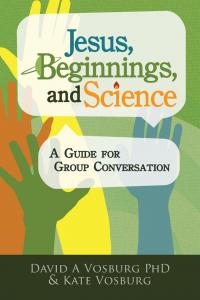How can we start productive conversations on science and Christian faith?
Are there any good study guides for small groups or college fellowships?
Can we open the conversation without advocating for a particular approach?
 I recently received a copy of a new resource written by David and Kate Vosburg: Jesus, Beginnings, and Science.
I recently received a copy of a new resource written by David and Kate Vosburg: Jesus, Beginnings, and Science.
David is a chemist, a Professor of Chemistry at Harvey Mudd College in Claremont CA. His background and ongoing research is in the area of organic synthesis, his college website notes that he and his students “seek make medicinally useful molecules in new ways.” Among other things they focus on biomimetic and/or enviornmentally friendly (“green”) pathways. David has also been actively involved in campus fellowships. Among other things, he wrote a study guide (available free here) for the BioLogos film From the Dust and had great success using this resource as a way to open conversations with both Christian and non-Christian students.
In Jesus, Beginnings, and Science David has teamed with his wife, Kate, to produce a broader guide for conversation. Kate is a campus pastor with InterVarsity at the Claremont Colleges. She is approaching twenty years of experience working with college students in campus ministries. The book contains twelve studies arranged in three parts. The purpose isn’t to convince any participant of a particular position, beyond the truth of Christian faith. The focus is on the breadth of Scripture and how it applies to the questions at hand.
Creation. The first part focuses on biblical passages on creation. Everyone realizes that Genesis 1 and 2 portray God’s act of creation, but there are many more passages to consider as well. For example Job 38-41 (one of my favorites), Psalm 104, Proverbs 8, Isaiah 40-55, 65, John 1, Romans 8, and Colossians 1 and more. The diversity of passages should certainly help to guide our thinking on beginnings.
Rather than jumping straight into Genesis, the Vosburg’s start with John 1:1-5, Colossians 1:15-17, and Hebrews 1:1-3. As Christians our discussion of beginnings should begin with Jesus, who was in the beginning and through whom all things were made. The second study looks at Psalm 104 and on poetic expressions of creation. Only after these two passages is Genesis 1 introduced into the conversation. The final study in part one moves to Revelation 21:1-22:5 and new creation. David adds a short reflection to each study from his perspective as a scientist.
Human Origins. Part two turns to the more complex questions surrounding human origins and the nature of Scripture. The four studies here run through a consideration of what it means to consider Scripture as the inspired word of God, followed by studies in Genesis 2, 1 Corinthians 1:9-17, and Psalm 139. Genesis 2 makes sense, as does Psalm 139 (especially v. 13-14: For you created my inmost being; you knit me together in my mother’s womb. I praise you because I am fearfully and wonderfully made; your works are wonderful, I know that full well.)
The passage from 1 Corinthians 1 may seem out of place. Here, however, the interest is on the call for Christians to find unity in their primary focus on Jesus rather than dividing on secondary issues. David and Kate do not advocate for any specific position, but note that young earth creation, old earth creation, and evolutionary creation and their variations are all positions that can be faithful to the historic Christian faith. Although they note that although the young earth position is inconsistent with modern science, it isn’t inconsistent with Scripture or Christian faith. David’s reflections as a scientist are more substantive in this section than in Part One and may help to guide some fruitful discussions.
The Bible and Science. The final four studies open questions about the Bible and Science. What should we think about the “scientific” content of the Bible? What does it mean to be humble and seek wisdom in our understanding of God’s creation? (Job 38 is the focus here.) There are limits to human understanding. The wisdom literature of the Old Testament can teach us how to approach tough questions. In addition to God’s speeches in Job, the Vosburg’s also focus a study on Ecclesiastes 1. The final study returns to Psalms. David reflects on science and Christian faith. There is an important place for Christians in the sciences, not to refute evolutionary theory, but as witnesses and to have a place at the table in important moral and ethical conversations. As in part two, David’s reflections here are substantive and make an important contribution to the book.
Although the overall study is an outline, and contemplation of the various passages is left to the participants, David and Kate Vosburg provide an extensive bibliography of resources available for further study. Most of the books I have read and discussed in posts over the years, but there are a few I haven’t read and you can expect posts on at least one of these down the road.
This book should make an excellent resource to guide group conversations on the questions of science and Christian faith. It is well worth a look, especially for college pastors on campus and in local churches.
—————————
If you wish to contact me directly you may do so at rjs4mail [at] att.net.
If interested you can subscribe to a full text feed of my posts at Musings on Science and Theology.











